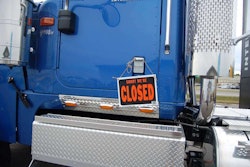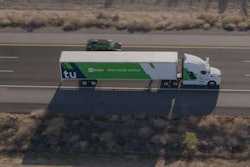This photo does show the work troopers and local officers do to serve the public. But also in that photo is a man struggling with the decision to take his own life. Please remember help is available through the National Suicide Prevention Lifeline at 1-800-273-8255. pic.twitter.com/RBAlCIXT1o
— MSP Metro Detroit (@mspmetrodet) April 24, 2018
Thirteen truck drivers were part of a coordinated effort by Michigan State Police to prevent a man’s suicide attempt early Tuesday morning on I-696 at Coolidge.
Police received calls about an individual on the overpass and officers responded and found a male on the outside fencing. Officers closed the freeway in both directions but pulled the trucks out of traffic and waved them through. The truckers were instructed to line up under the overpass, with the intent to reduce the length of the man’s fall if he jumped.
Officers were ultimately able to talk the man down and he was transported to a local hospital for treatment.
“The thought process is if somebody does lose their grip or if they do decide to jump then they’re only falling about five feet or six feet instead of falling 12 to 14 to 16 feet onto the cement below,” said 1st Lt. Michael Shaw, a public information officer for the department.
The creative approach caught the attention of national media, but Shaw said this is a typical response for the department. They respond to suicide attempts on overpasses by lining up trucks underneath about one to two times every three months or so, he estimated. Usually officers only get one or two trucks under the overpass before the situation is resolved but because this particular incident lasted a couple hours, from between 1-5 a.m., they were able to line the entire highway with trucks. The department has used this approach for as long as Shaw can remember, since at least 1995 when he joined the force.
“We’ll start to direct traffic off the freeway system and as we’re starting to direct traffic off the freeway system what we’ll do is we’ll look for semi trucks and we’ll commandeer the driver and the truck and have them, instead of exiting the freeway, continue on down the freeway to where another law enforcement trooper is and we’ll start to line them up under the overpass,” Shaw said.
Shaw can’t recall a single driver ever refusing to participate. He referred to the drivers as “volun-told,” meaning that while troopers don’t usually pause to ask the drivers whether or not they want to participate, they’ve also never had an issue with a driver trying to turn them down.
“We never really get that far because as a state trooper I’m just going to tell you what to do, but we’ve never been refused by anybody. Usually we don’t even get out of our mouths what we’re doing and the truckers are always appreciative. We know for them it’s a big commitment as well,” Shaw said. “They’ve got a boss that’s sitting there wanting to know why the load is late or looking to dock their pay and things like that, so we do appreciate their time.”
A 12- to 13-foot fall onto concrete is typically going to be a fatal fall. The truckers play a critical role in helping reduce that risk.
“Having that semi truck driver under there is a lot easier for us, so even though we’re talking to the person or trying to get them down, we also kind of have that safety net underneath knowing if they do decide to jump or they lose their grip and they fall, at least they’re only falling a few feet and maybe will get some minor injuries compared to losing their life,” Shaw said.
While Shaw acknowledged the vital role the troopers and truckers played, he said he didn’t want to lose focus on the individual.
“Yes, the troopers did a great job and the truckers did a great job but he was kind of a hero today, too. He made the decision not to take his life and put his family in that position. I don’t want to forget about this male that was up there as well,” Shaw said.











